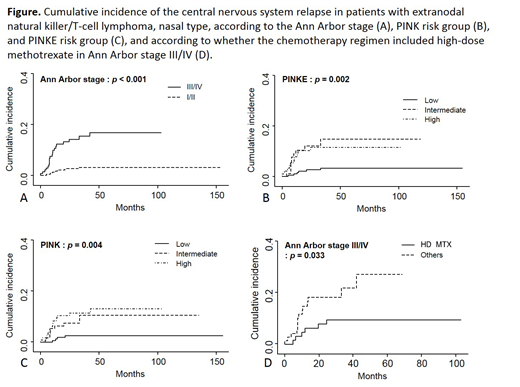Background: The incidence of central nervous system (CNS) involvement is rare ranging from 0 to 6% in patients with extranodal NK/T cell lymphoma, nasal type. A few studies have suggested that CNS prophylaxis should be considered in the high PINK group, but it is unclear because of relatively small numbers of patients. However, non-anthracycline-based chemotherapy with L-asparaginase improved the survival outcome, and the frequency of CNS relapse is expected to increase. Therefore, we aimed to identify the incidence and risk factors for CNS relapse and to evaluate the need for CNS prophylaxis with high-dose methotrexate (HD MTX) regimens.
Patients and methods: We retrospectively reviewed 399 patients who had diagnosed with extranodal NK/T-cell lymphoma, nasal type, and received non-anthracycline based chemotherapy from January 2000 to January 2019 at multicenter in Korea. The CNS relapse was defined as a brain parenchymal or leptomeningeal involvement confirmed either by MRI or CSF study during chemotherapy or follow-up period. For subgroup analysis, we used the prognostic index of natural killer lymphoma (PINK), and the prognostic index of natural killer lymphoma with Epstein-Barr virus DNA (PINK-E), which includes age, Ann Arbor stage, lymph node involvement, and EBV DNA. Patients were divided into two groups, according to whether the chemotherapy regimen included HD-MTX.
Results: Twenty-seven patients (6.8%, 27/399) experienced CNS relapse during chemotherapy or follow-up period. The median overall survival of all patients was 93.7 months [95% confidence interval (CI) 72.53-114.95], and the median time to CNS relapse of 27 patients was 10.1 months (range 0.0-42.0). The clinical variables associated with CNS relapse were BM involvement (HR 4.026, p=0.002), extranodal involvement≥2 (HR 8.198, p<0.001), EBV DNA (HR 3.90, p=0.013), Ann Arbor stage III/IV (HR 9.397, p<0.001), PINK [intermediate (HR 4.700, p=0.009), high (HR 9.554, p<0.001)], and PINK-E [intermediate (HR 6.032, p=0.001), high (HR 6.775, p<0.001)]. In multivariate analysis, PINK was the powerful predictor of CNS relapse (HR 3.486, p=0.019). The cumulative incidence of CNS relapse was significantly different between groups of Ann Arbor stage (p<0.001), PINK (p=0.004), or PINK-E (p=0.002). The incidence of CNS relapse in patients with/without HD-MTX regimens was six patients (6/101, 5.9%) and 21 patients (21/298, 7.0%). Although there was no significant difference between both treatment groups in all patients, the patients who received chemotherapy with HD MTX regimens had a lower incidence of CNS relapse than those who received other regimens in Ann Arbor stage III/IV (p=0.033).
Conclusions: We demonstrate the strong predictability of PINK and PINK-E for CNS relapse in patients with extranodal NK/T-cell lymphoma, nasal type. HD MTX regimens reduced the incidence of CNS relapse in Ann Arbor stage III/IV groups, and CNS prophylaxis should be considered for these patients.
Kim:F. Hoffmann-La Roche Ltd: Research Funding; Celltrion: Research Funding; Novartis: Research Funding; Donga: Research Funding; Kyowa-Kirin: Research Funding; Novartis: Research Funding; J + J: Research Funding.
Author notes
Asterisk with author names denotes non-ASH members.


This feature is available to Subscribers Only
Sign In or Create an Account Close Modal